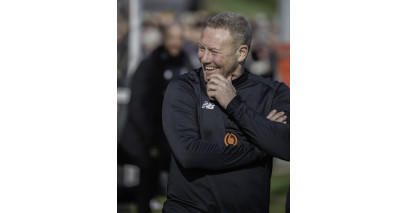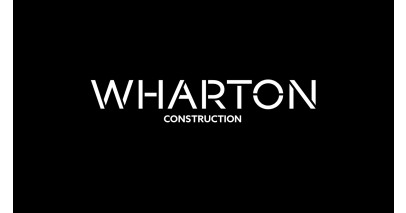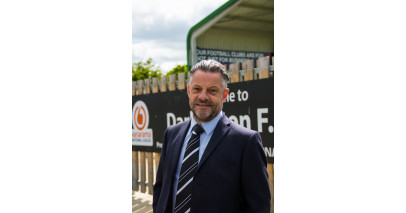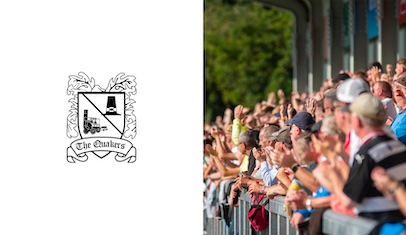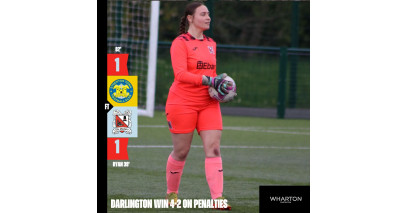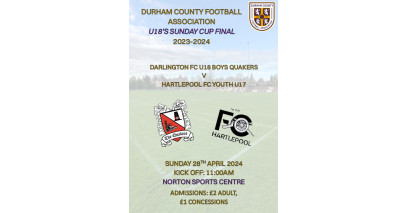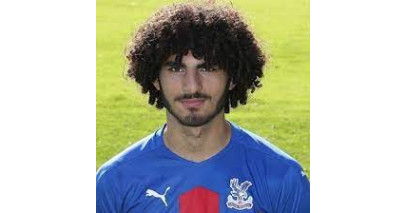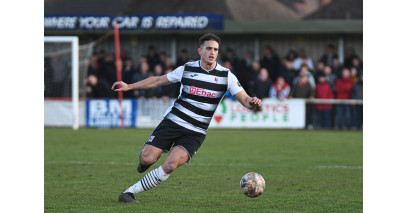Memory match -- Cambridge 1973
By Ray Simpson
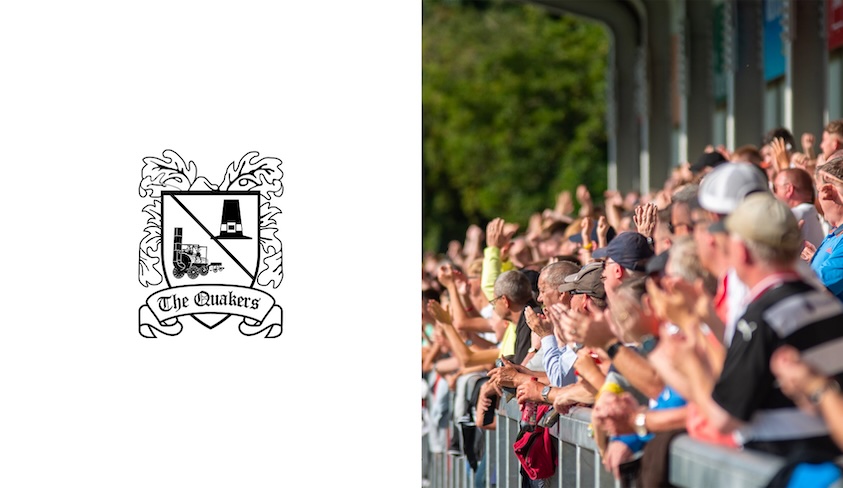
Simon Weatherill recalls the home game against Cambridge and the visit of David Frost on February 1...

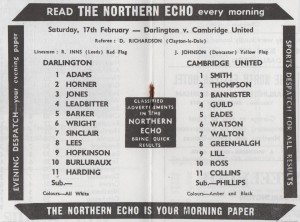
Simon Weatherill recalls the home game against Cambridge and the visit of David Frost on February 17th 1973.
The 1972/73 season was not a great time to be a Darlington supporter, with the club in complete turmoil. As the new year dawned in 1973 the Quakers found themselves at the foot of the Division 4 table, on the brink of financial collapse, with attendances falling to an all time low and a deeply unpopular chairman, George Tait, who seemed to be upsetting everyone – players, press, supporters and even fellow directors – with his comments and refusal to improve the playing squad.
When Tait had appointed Allan Jones as manager in the previous summer, he’d described him as a “budding Brian Clough” and “destined for great things”. Things didn’t start too well and by October, the club’s poor start to the season was put down to a lack of support, and Tait warned that unless attendances improved the club faced extinction. A month later and Tait had changed his stance slightly. “I don’t blame the supporters for staying away. The football we are playing at the moment is rubbish”. He then turned on the local press for making “truly malicious and untrue statements” about his intentions. Jones was sacked as manager in the December (the fourth manager to leave Feethams in 14 months) and replaced by Ralph Brand. Brand was an ex Scottish international who had played for Sunderland, Manchester City and Rangers, but this was his first attempt at management.
Darlington gained national attention in the February when David Frost spent a week in the town making a programme for his popular Sunday night TV series “The Frost Programme”. He interviewed the chairman, manager, players, supporters and even people in the pubs and clubs around the town as to why they didn’t support the team. He even joined in training to get an accurate idea of what life was like for a Darlington footballer. The week started with a 5-0 thumping at Chester on the Saturday. This was due to be followed by a Tuesday night home game against Workington but that was postponed as the Feethams pitch was frozen rock solid. The weather relented and the pitch thawed to allow Saturday’s game against Cambridge to take place, although conditions were described as “extremely heavy”.
Brand wanted to make changes after the Chester defeat but was restricted by the size of his squad. One enforced change came at centre forward. Peter Graham had fractured his cheekbone at Chester and would miss the game. His place would go to triallist Ian Hopkinson. The only other change to the starting eleven would see Steve Holbrook return to the side in place of John Leadbitter. Darlington had won 3-0 at Cambridge on the first day of the season, but the two club’s fortunes had changed dramatically since then. The Quakers had won only three more times and sat bottom of the table with 15 points from their 29 games so far. Cambridge sat in 4th place and were challenging for promotion. They had 37 points from 32 games.
A crowd of 1412 turned out at Feethams to see the game. On an absolute quagmire of a pitch they saw the home side make a spirited start with several openings in the first few minutes. They forced their first corner on two minutes but it came to nothing. A minute later a Gordon Jones free kick flashed across goal without anyone getting a touch, then Colin Sinclair missed a good chance when he miskicked in the heavy mud inside the Cambridge area after being put through by Geoff Barker. In the ninth minute the Quakers grabbed the lead that their early pressure deserved when Don Burluraux scored. Steve Holbrook took possession in the centre of the field and played in Burluraux down the left. The winger took the ball in his stride, side stepped his full back and fired in a low drive from just inside the box. Ten minutes later things got even better for the home side when Norman Lees fired in a superb second goal, winning the ball in a tackle just outside the box and crashing the ball home from 20 yards out. Cambridge pulled a goal back in the 24th minute. Bobby Ross fired in a cross and goalkeeper Ernie Adams lost his footing in the thick mud in front of his goal and David Lill tapped into the unguarded net. Darlington stormed back and put heavy pressure on the visitors’ goal with Sinclair firing narrowly over, then beating two defenders before shooting wide. Completely against the run of play, Cambridge equalised in the 40th minute. Brian Greenhalgh fired in a shot, which Adams couldn’t hold and Walton got the final touch as the ball rolled through the mud towards the home goal. Only two minutes later another defensive mix up handed Cambridge the lead. Lill fired in a hard, low cross and as Walton challenged the diving Adams, the ball ran loose to Ross who tapped home. From 2-0 in front, the Quakers had managed to concede three sloppy, goalmouth scramble like goals to go in at half time 3-2 behind. Adams had never looked comfortable in the treacherous conditions and United had taken full advantage.
Darlington started the second half strongly and managed to draw level in the 51st minute. Alan Harding put Ian Hopkinson in the clear with a clever through ball and the triallist steadied himself and curled his shot around the keeper just inside the far post. Lill hit a shot just wide a minute later, but that was the last threat that the visitors posed, as the Quakers pushed for a winner. Sinclair should have done better, when he delayed his shot too long with the goal at his mercy. Then Burluraux took over, constantly threatening with strong runs down the left. United keeper Graham Smith was in fine form though and saved his side a point with several fine saves in the last 15 minutes as Darlington had to settle for the draw in the Feethams mud.
Things never really improved for the Quakers on the pitch. It would be another eleven games before they registered their next win, 3-1 at home to Crewe. They finished the season rock bottom with 29 points from 46 games. They’d managed only seven wins and had scored only 42 goals. Supporters voted with their feet and the average attendance was 1697, the lowest in the club’s history. The Frost Programme did not make for pretty viewing, but the sympathy and goodwill generated by the 60 minutes of TV fame probably helped the club in their re-election application, at the League’s AGM in June. All four League clubs were re-elected. Colchester (with 48 votes), Northampton (43), Crewe (36) and Darlington (26), beating applications by Yeovil (14), Kettering (12) and Wigan (10).
The programme for 1972/73 consisted of 16 pages and cost 5p. The front cover was printed in blue for some reason and featured the new club badge. Inside were programme notes, an action photo from a previous game, a league table, today’s ref, appearances and goalscorers, star spot of the week featuring one of the first team squad (the squad was so small, some players featured twice or even three times during the season), half time scoreboard, results and fixtures, pen pictures of the opposition and the team line-ups.
Team v Cambridge : 1 Ernie Adams 2 Mick Wright 3 Gordon Jones 4 Norman Lees 5 Geoff Barker 6 Billy Horner 7 Steve Holbrook 8 Colin Sinclair 9 Ian Hopkinson 10 Don Burluraux 11 Alan Harding 12 Alan Sproates (not used)




